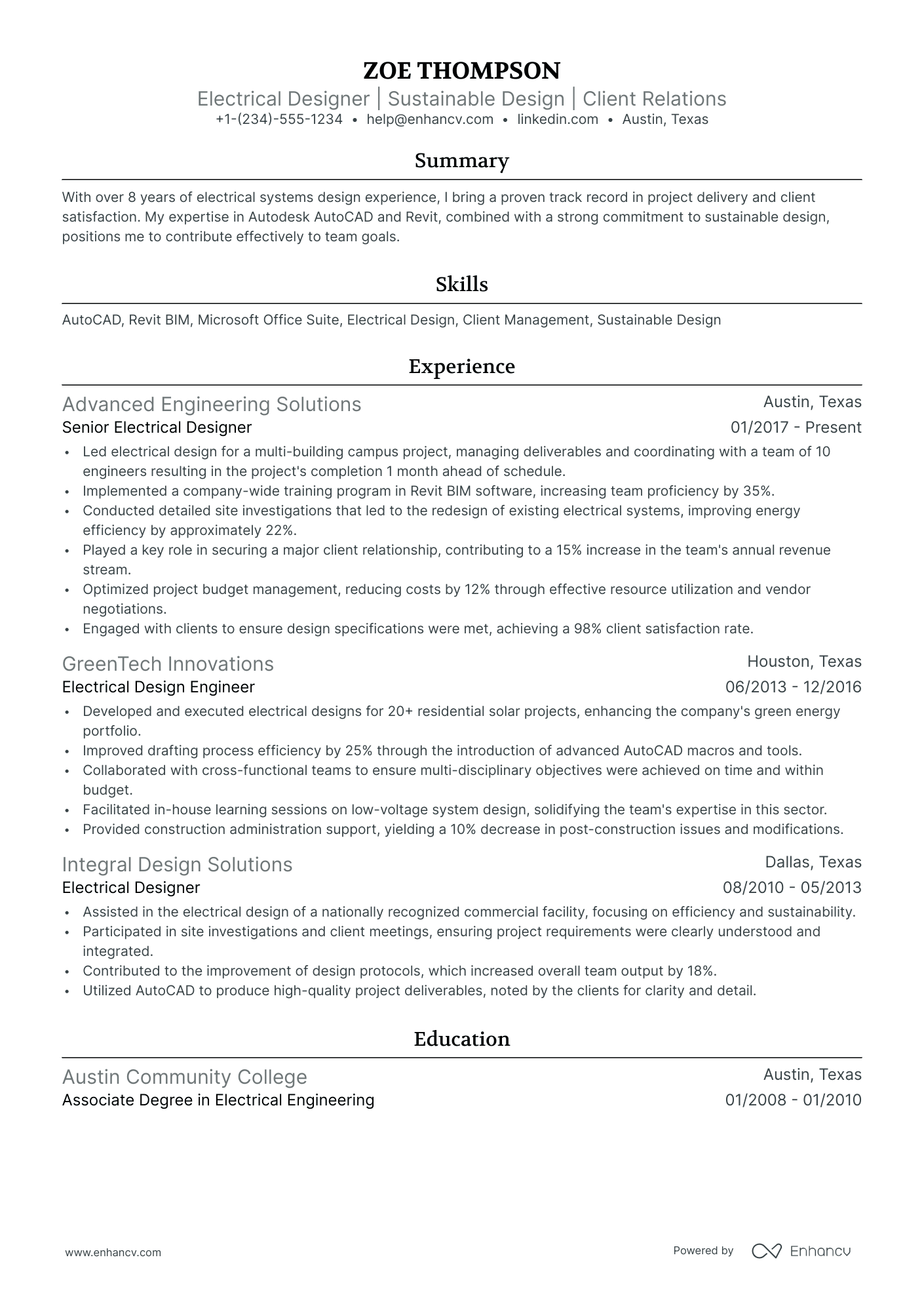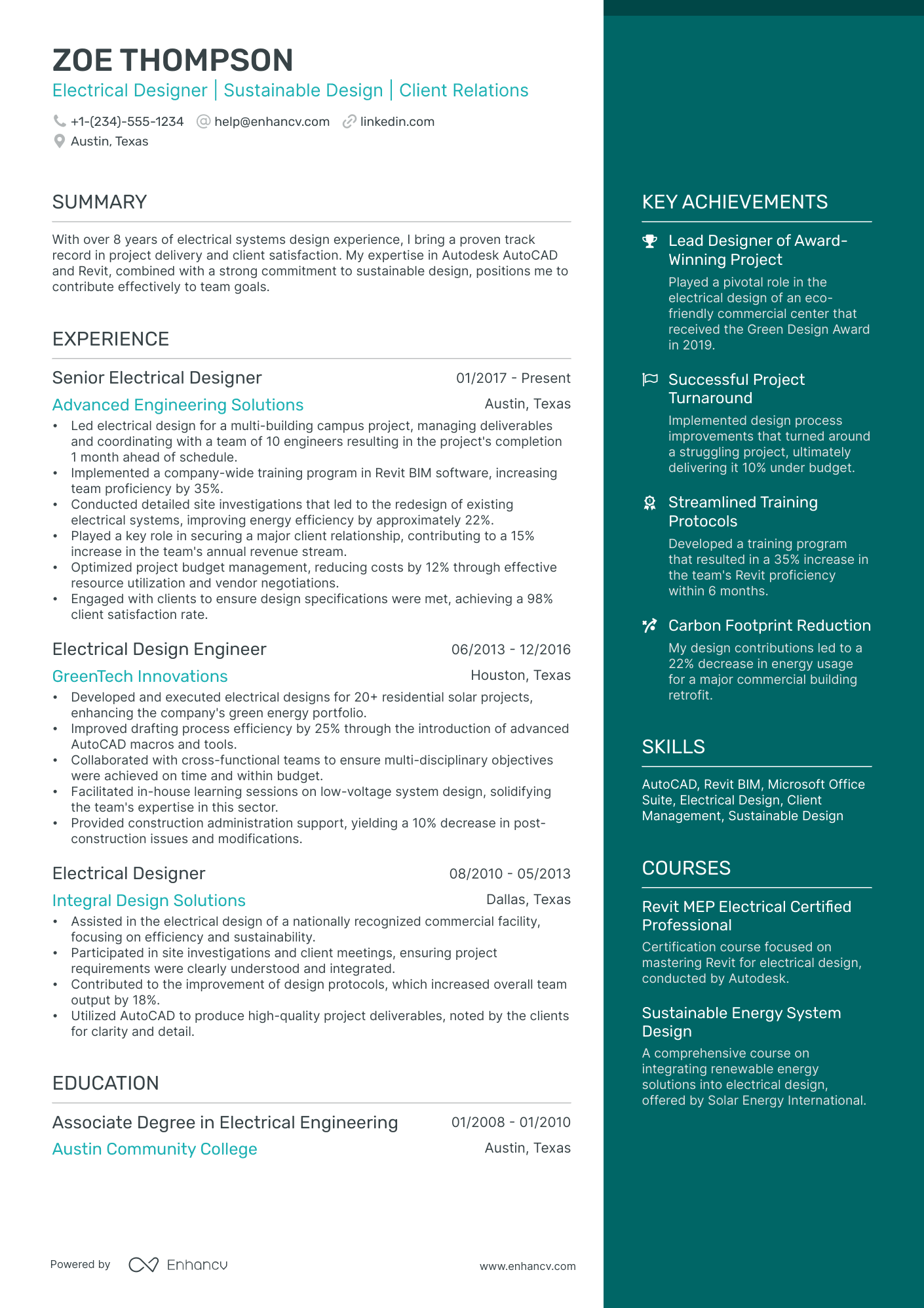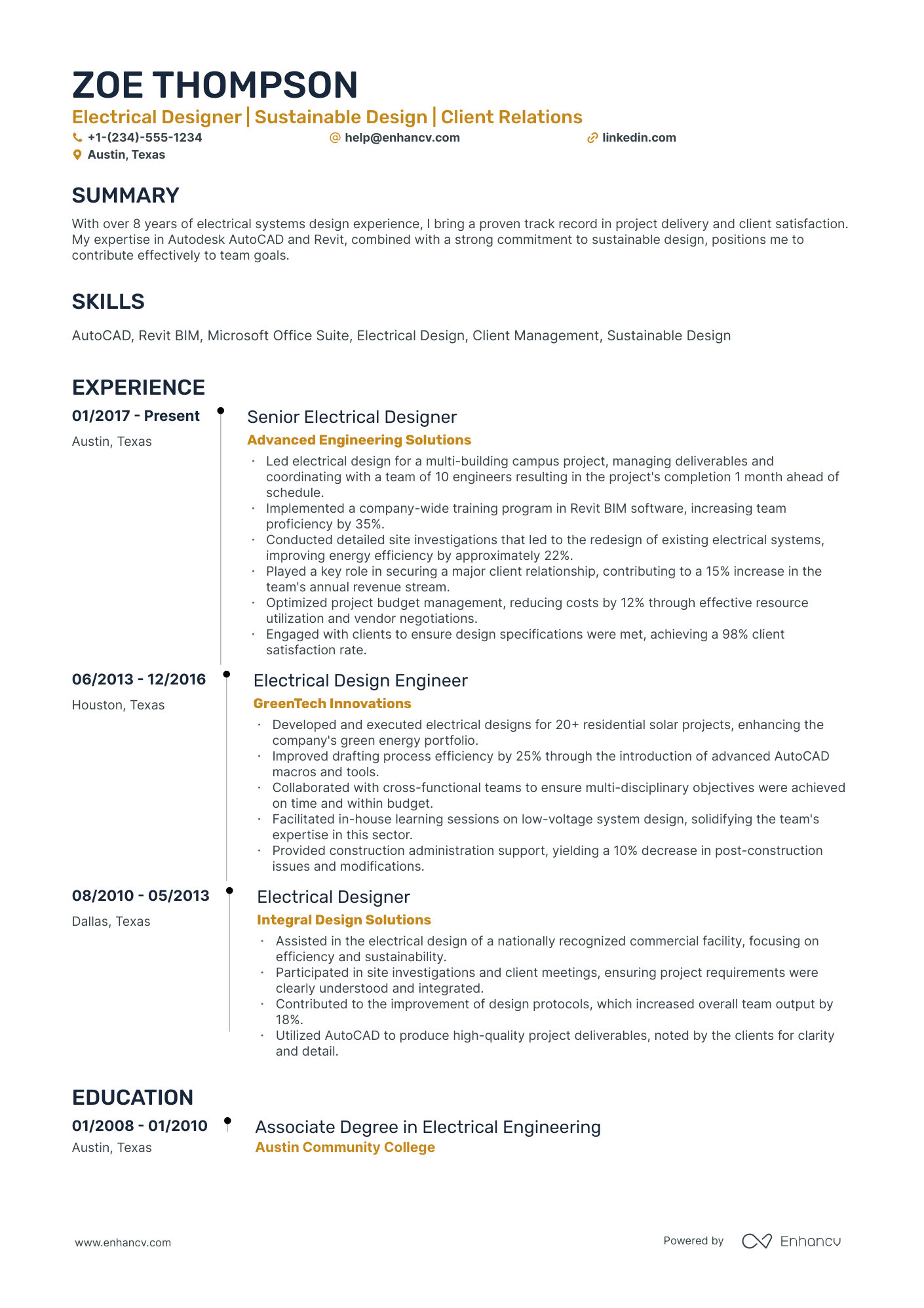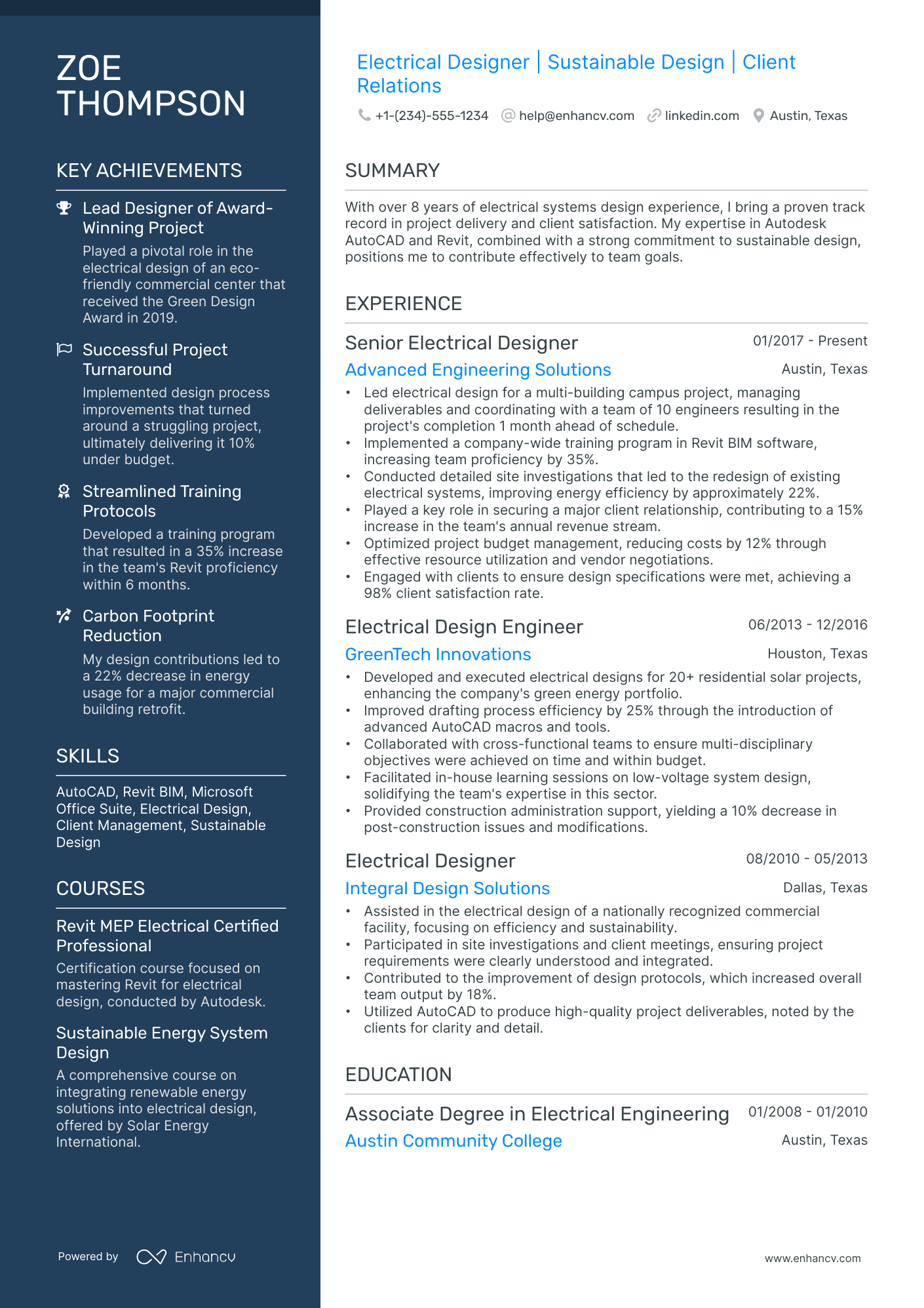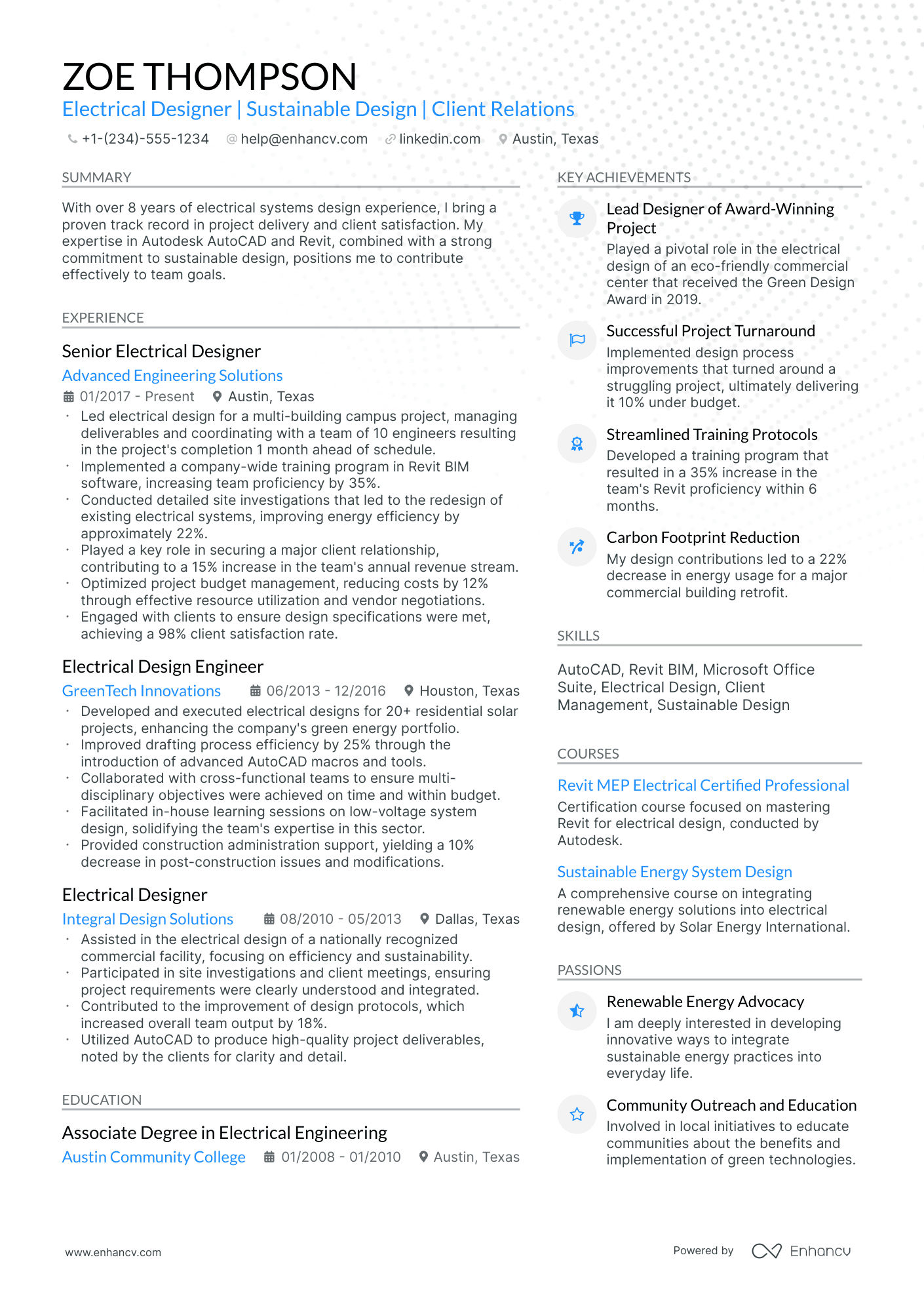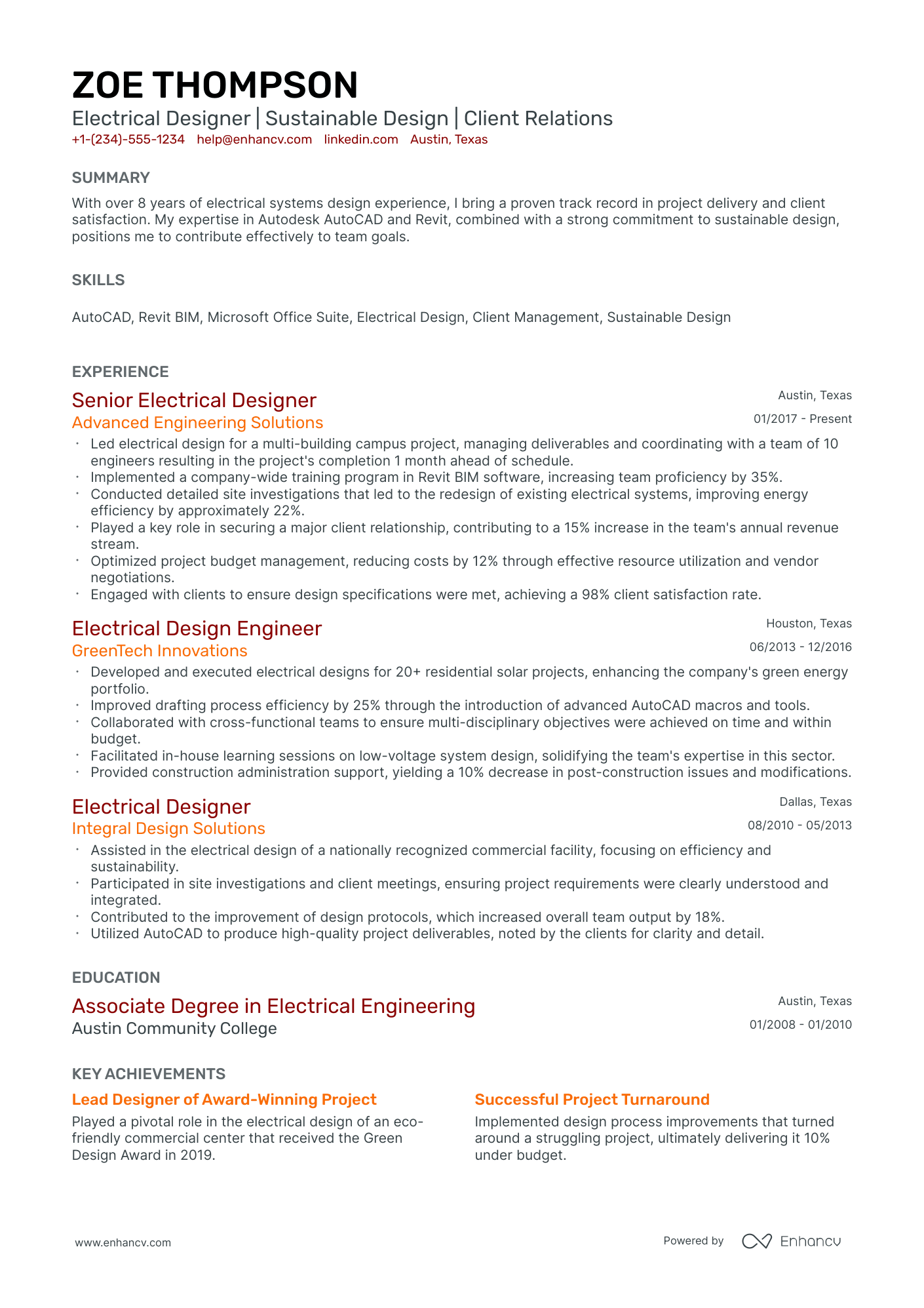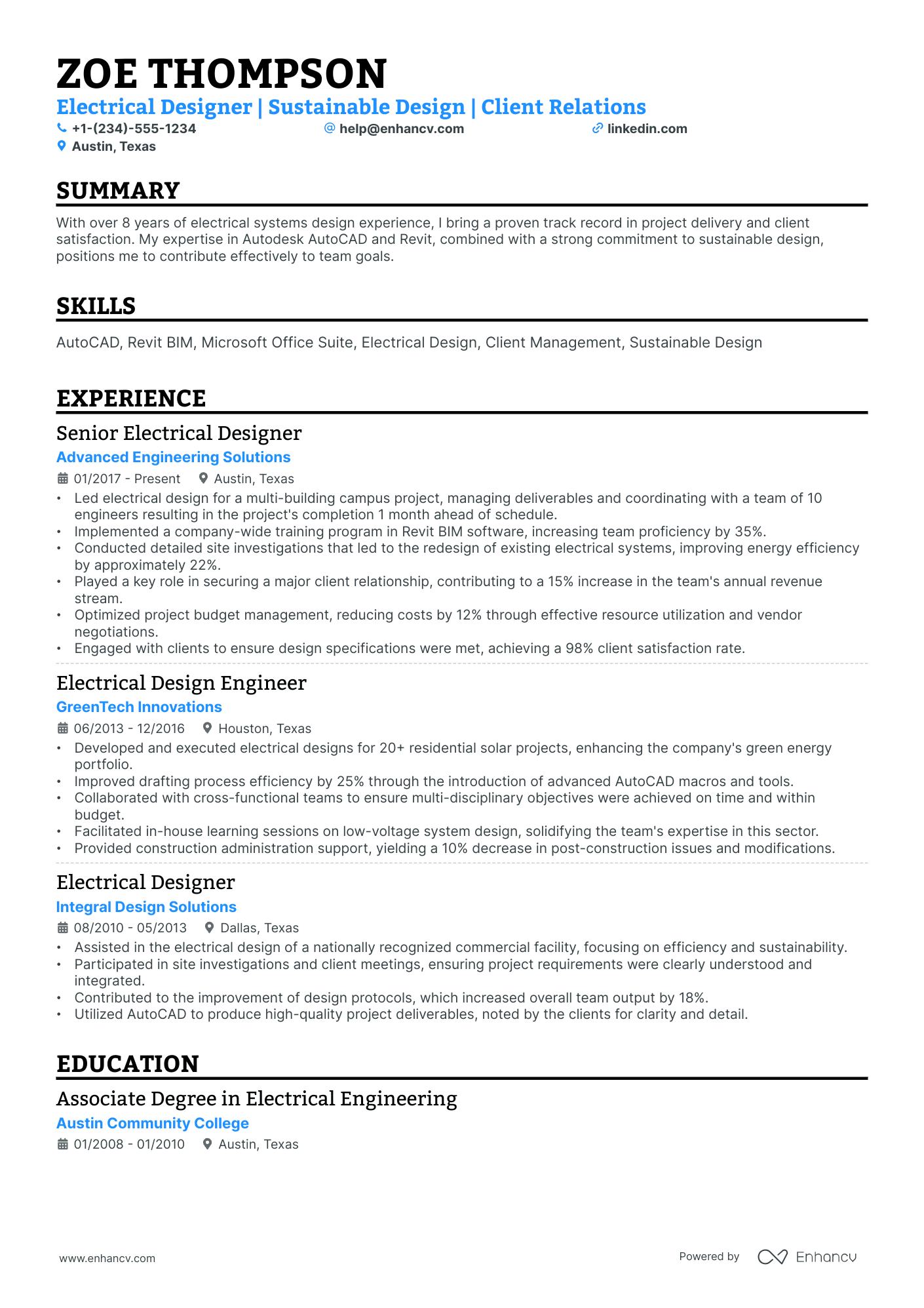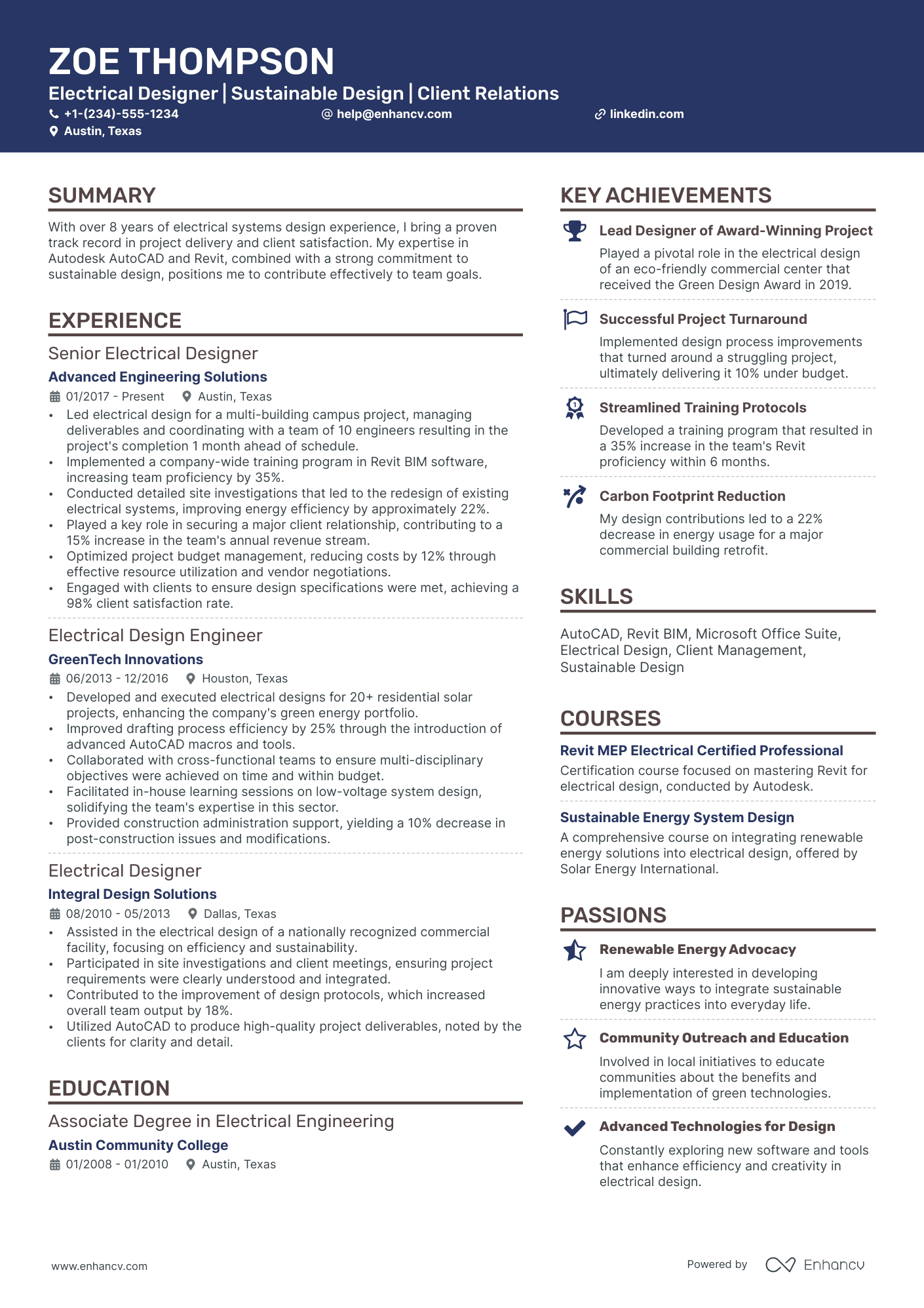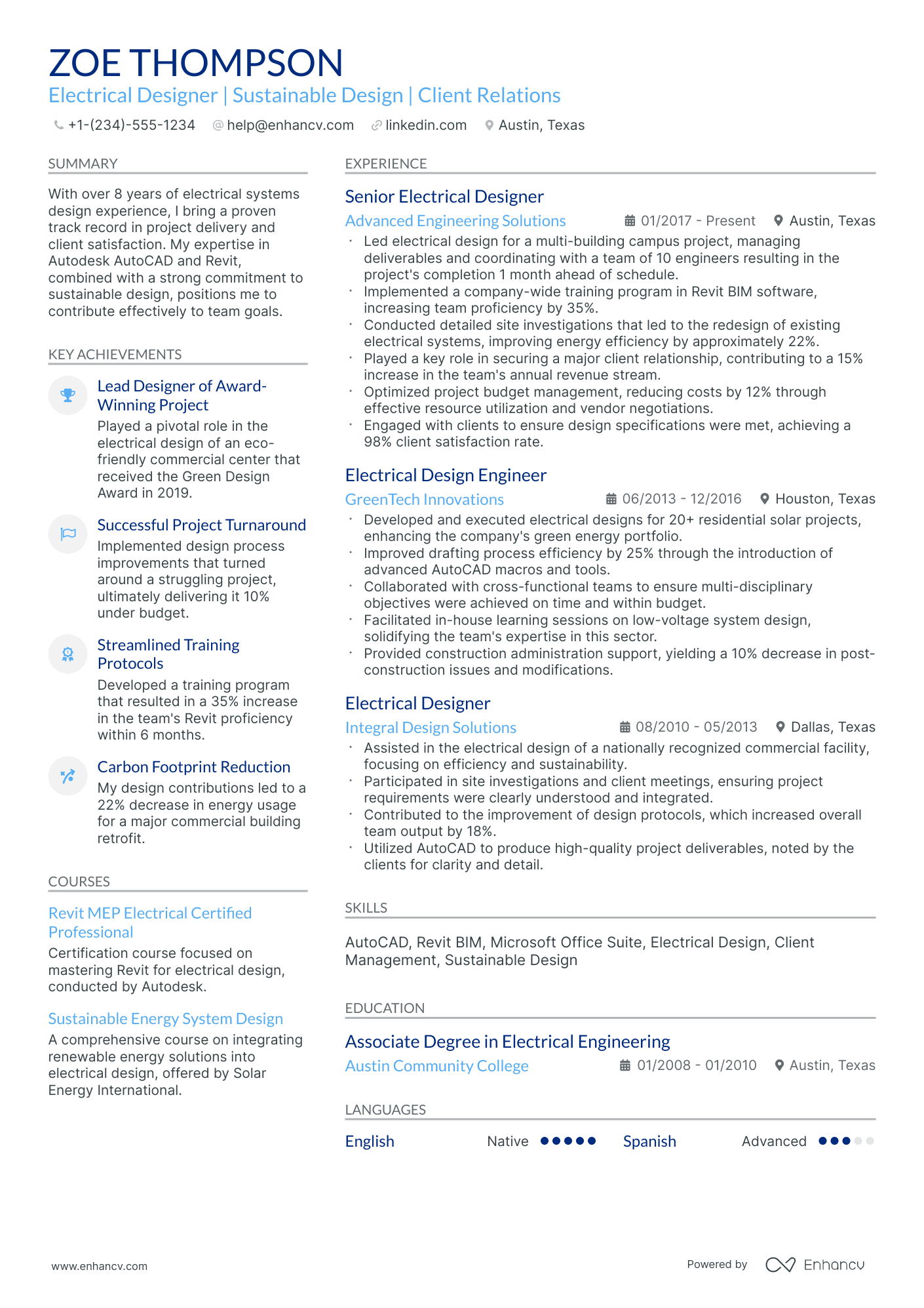As an electrical designer, one resume challenge you might face is effectively highlighting your technical skills and project experience in a way that stands out to hiring managers. Our guide provides targeted advice on structuring your resume, ensuring your unique qualifications and contributions as an electrical designer shine through to potential employers.
- The most straightforward and effective resume format, ensuring your electrical designer resume stands out among numerous candidate profiles;
- The significance of the top one-third of your resume, including the header, summary or objective, and skills section, and its impact on recruiters;
- Frameworks and structures used by real electrical designer professionals, offering insights on how to enhance your resume with industry-specific expertise;
- A variety of electrical designer resume sections that bolster your profile, showcasing your comprehensive capabilities and distinctiveness.
Gaining insights from the best has never been easier. Explore more electrical designer resume examples below:
Optimize your electrical designer resume format to pass the recruiters' assessment
You may be wondering just how much time you need to spend on designing your electrical designer resume.
What recruiters are looking for is systematised content that is clear and coherent. Thus, your electrical designer resume needs to answer requirements and why you're the best candidate for the role from the get-go.
Often, a clear layout consists of:
- Sorting your experience in the reverse chronological order - starting with your most recent and relevant roles. This is an excellent choice for more experienced professionals;
- Writing your contact information (e.g. personal phone number and email address) and your portfolio or LinkedIn link in your electrical designer resume header. If you're wondering to include a photo or not, always make sure that it's appropriate for the country you're applying in;
- Use the basic, most important electrical designer resume sections - your experience, education, summary, etc. Use your resume's real estate wisely to tell a compelling, professional story and match job description's keywords;
- Don't go overboard with the length of your resume. One page is absolutely fine if you happen to have under a decade of relevant experience.
Are you still wondering if you should submit your electrical designer resume in PDF or Word format ? The PDF has a few more advantages, as it doesn't change the format and the text can't be altered upon application.
Format matters most when your electrical designer resume is assessed by the Applicant Tracker System (or the ATS).
The ATS parses resumes, looking for specific keywords, skills or experience that match the job description.
P.S. We recently did a study on how the ATS works and were able to demystify three of the biggest misconceptions about how it assesses candidate resumes.
To pass the ATS evaluation, select any of the serif or sans-serif fonts. Popular choices that would help your electrical designer resume stand out include Raleway, Exo 2, Montserrat, etc.
Most traditionalists go for Arial or Times New Roman, but it's often the case that many candidates choose these fonts, and you'd thus lose points on the uniqueness front.
Your resume should match the market – Canadian applications, for instance, may use a different layout.
Upload & Check Your Resume
Drop your resume here or choose a file. PDF & DOCX only. Max 2MB file size.
PRO TIP
Highlight any significant extracurricular activities that demonstrate valuable skills or leadership.
Fundamental sections for your electrical designer resume:
- The header with your name (if your degree or certification is impressive, you can add the title as a follow up to your name), contact details, portfolio link, and headline
- The summary or objective aligning your career and resume achievements with the role
- The experience section to curate neatly organized bullets with your tangible at-work-success
- Skills listed through various sections of your resume and within an exclusive sidebar
- The education and certifications for more credibility and industry-wide expertise
What recruiters want to see on your resume:
- Demonstrated expertise in electrical CAD software such as AutoCAD Electrical, SolidWorks Electrical, or EPLAN.
- Understanding of electrical codes and safety regulations such as the National Electrical Code (NEC) or relevant international standards.
- Experience with designing electrical systems and circuitry for specific industries such as residential, commercial, industrial, or power systems.
- Proficiency in electrical system simulation and analysis tools like ETAP, PSpice, or MATLAB/Simulink.
- Track record of successful project management and collaboration with interdisciplinary engineering teams.
What is the resume experience section and how to write one for your past roles
The experience section in a electrical designer resume is critical for your profile and overall application. It should not only display your work history, but also highlight your achievements in previous roles.
Many candidates either simply list their duties or provide excessive details about past, irrelevant jobs. A more effective approach involves first examining the job advertisement for keywords - specifically, skills essential for the role. Then, demonstrate these key requirements throughout different parts of your resume, using accomplishments from your roles.
Format each bullet point in your experience section by starting with a strong action verb. Follow this with a description of your role and its impact on the team or organization.
Aim to include three to five bullet points for each role.
Finally, gain insights into how professionals have crafted their electrical designer resume experience sections by exploring some best practice examples.
- Spearheaded the electrical design for a new 150,000 sq. ft. manufacturing facility, incorporating energy-saving technologies that reduced the client's energy consumption by 25%.
- Collaborated closely with cross-functional teams to ensure seamless integration of electrical systems with mechanical and structural components during the construction of a high-rise commercial building.
- Managed a team of junior electrical designers, providing mentorship and guidance on complex projects such as the retrofitting of historical landmarks with modern electrical systems.
- Conducted a comprehensive analysis and redesign of the power distribution network for a metropolitan transit system, improving the overall efficiency by 18%.
- Pioneered the use of 3D modeling software within the department, greatly enhancing the accuracy and visualization of electrical schematics for client presentations.
- Acted as a liaison between the electrical design team and external contractors, ensuring adherence to specifications and timelines on several multimillion-dollar projects.
- Developed the complete electrical layout for a state-of-the-art solar farm project, leading to a generation capacity increase of 40 megawatts.
- Implemented cost-saving initiatives through the selection of alternative wiring materials, saving the company approximately $200,000 across various projects.
- Provided technical support and expertise in the development of fail-safe electrical systems for hazardous environments, contributing to a notable reduction in safety incidents.
- Oversaw the electrical design and installation for a major industrial automation project, enhancing operational efficiency by 33%.
- Facilitated the transition to LED lighting systems for multiple office buildings, resulting in a 20% cost reduction in lighting expenses annually.
- Assessed and improved grounding and bonding practices, significantly minimizing electrical hazards and ensuring compliance with NEC standards.
- Played a key role in the electrical design of a large-scale wind power project that increased the farm's output by 50 megawatts.
- Facilitated hands-on workshops for new software tools, raising the electrical design team's productivity by 15% within six months.
- Coordinated with vendors to secure high-quality electrical components, thus enhancing the reliability of power systems in critical infrastructure projects.
- Led the upgrade of electrical systems in commercial properties to comply with the latest smart building technologies, boosting building automation efficiency by 30%.
- Authored comprehensive project documentation, including design specifications and maintenance manuals, which became a company reference for future initiatives.
- Designed custom electrical solutions for unique client needs in the entertainment industry, helping in the setup of state-of-the-art lighting and sound systems.
- Designed and executed the electrical plan for a new civic center, which included advanced security and communication systems to accommodate large public events.
- Contributed to the reduction of project lead time by 20% through the implementation of agile methodologies within the design process.
- Streamlined the department's CAD standards, leading to a more consistent design output and faster approval times from regulatory agencies.
- Successfully completed the electrical design for an underwater tunnel project, ensuring robust power and lighting systems that can withstand harsh marine conditions.
- Introduced advanced simulation techniques to forecast potential electrical issues, effectively reducing troubleshooting costs by 25% post-construction.
- Organized and maintained a comprehensive database of electrical components, which helped in reducing procurement time by 35%.
- Conceptualized and deployed an intelligent lighting control system within a network of retail spaces, achieving a significant reduction in operational costs of 22%.
- Played a decisive role in the company's expansion into renewable energy projects, designing primary electrical infrastructures for multiple geothermal plants.
- Standardized electrical design procedures across the company's various branches, resulting in better consistency and a 10% increase in overall project delivery speeds.
- Pioneered the electrical design for an eco-friendly housing development, integrating solar power systems that met 70% of the community's energy needs.
- Worked collaboratively with international teams to harmonize design standards, greatly improving the interoperability of electrical systems in global projects.
- Mentored a group of junior designers, resulting in their accelerated career advancement and the successful delivery of sophisticated electrical designs.
The following content includes information from "O*NET OnLine" by the U.S. Department of Labor, Employment and Training Administration (USDOL/ETA). Used under the CC BY 4.0 license. The data represents the top responsibilities present on the task lists for electrical designer professionals.
Top Responsibilities for Electrical Designer:
- Design, implement, maintain, or improve electrical instruments, equipment, facilities, components, products, or systems for commercial, industrial, or domestic purposes.
- Oversee project production efforts to assure projects are completed on time and within budget.
- Direct or coordinate manufacturing, construction, installation, maintenance, support, documentation, or testing activities to ensure compliance with specifications, codes, or customer requirements.
- Perform detailed calculations to compute and establish manufacturing, construction, or installation standards or specifications.
- Operate computer-assisted engineering or design software or equipment to perform engineering tasks.
- Confer with engineers, customers, or others to discuss existing or potential engineering projects or products.
- Investigate or test vendors' or competitors' products.
- Inspect completed installations and observe operations to ensure conformance to design and equipment specifications and compliance with operational, safety, or environmental standards.
- Investigate customer or public complaints to determine the nature and extent of problems.
- Prepare technical drawings, specifications of electrical systems, or topographical maps to ensure that installation and operations conform to standards and customer requirements.
Quantifying impact on your resume
- Include the total value of the projects you have worked on, demonstrating your experience with significant budgets.
- List the percentage of energy savings achieved in your designs to highlight your commitment to sustainability and efficiency.
- Detail the number of projects you've completed on time and within budget to showcase project management skills.
- Mention the scale of the electrical systems you've designed, such as the number of circuits or components, to illustrate the complexity of your work.
- Quantify any reductions in downtime or maintenance costs that your designs have contributed to.
- Specify the number of technical reports or documentation pages you've produced to establish your communication and documentation abilities.
- State the number of cross-disciplinary teams you have collaborated with, showing teamwork and the ability to work across functions.
- Present the number of design revisions you have successfully implemented, reflecting your adaptability and problem-solving skills.
Action verbs for your electrical designer resume
What if you don't have any experience?
There are two very common scenarios about candidates with less experience. They are either:
- Fresh out of college in search of a electrical designer role
- Transferring over from a completely different field
Both of these types of candidates still have a shot at landing their first job in the industry.
All they need to do about the experience section of their electrical designer resume is:
- Consider their strengths - would the outcomes of their previous roles or niche skill sets impress recruiters? Feature those towards the top of your resume
- Exclude any and all irrelevant experience items - remember that at the end of the day, you're telling a story that aims to align with the ideal candidate for the electrical designer job
- Win recruiters over with personality - perhaps your ambition, dreams, and diligence would make you the perfect fit for the electrical designer role. Dedicate resume space to detail your personality traits by showcasing how they've helped you succeed in past roles
- Tailor your experience to specific job requirements - ensure your electrical designer resume answers the advert in the best way possible.
Recommended reads:
PRO TIP
The more trusted the organization you've attained your certificate (or degree) from, the more credible your skill set would be.
How to showcase hard skills and soft skills on your resume
Reading between the lines of your dream job, you find recruiters are looking for candidates who have specific software or hardware knowledge, and personal skills.
Any technology you're adept at shows your hard skills. This particular skill set answers initial job requirements, hinting at how much time your potential employers would have to invest in training you. Showcase you have the relevant technical background in your communicate, solve problems, and adapt to new environments. Basically, your interpersonal communication skills that show recruiters if you'd fit into the team and company culture. You could use the achievements section to tie in your greatest wins with relevant soft skills.
It's also a good idea to add some of your hard and soft skills across different resume sections (e.g. summary/objective, experience, etc.) to match the job requirements and pass the initial screening process. Remember to always check your skill spelling and ensure that you've copy-pasted the name of the desired skills from the job advert as is.
Top skills for your electrical designer resume:
AutoCAD
Revit
ETAP
MATLAB
PLC Programming
ArcGIS
PSpice
Microsoft Excel
Electrical Load Calculation Software
BIM Modeling
Communication
Problem-Solving
Team Collaboration
Attention to Detail
Time Management
Adaptability
Critical Thinking
Creativity
Project Management
Client Relations
Next, you will find information on the top technologies for electrical designer professonals from "O*NET OnLine" by the U.S. Department of Labor, Employment and Training Administration (USDOL/ETA). Used under the CC BY 4.0 license.
Top technologies for Electrical Designer’s resume:
- Minitab
- The MathWorks MATLAB
- Microsoft OneNote
- Microsoft Word
- Autodesk AutoCAD Civil 3D
- Autodesk Revit
PRO TIP
Listing your relevant degrees or certificates on your electrical designer resume is a win-win situation. Not only does it hint at your technical capabilities in the industry, but an array of soft skills, like perseverance, adaptability, and motivation.
Certifications and education: in-demand sections for your electrical designer resume
Your academic background in the form of certifications on your resume and your higher degree education is important to your application.
The certifications and education sections pinpoint a variety of hard and soft skills you possess, as well as your dedication to the industry.
Add relevant certificates to your electrical designer resume by:
- Add special achievements or recognitions you've received during your education or certification, only if they're really noteworthy and/or applicable to the role
- Be concise - don't list every and any certificate you've obtained through your career, but instead, select the ones that would be most impressive to the role
- Include the name of the certificate or degree, institution, graduation dates, and certificate license numbers (if possible)
- Organize your education in reverse chronological format, starting with the latest degree you have that's most applicable for the role
Think of the education and certification sections as the further credibility your electrical designer resume needs to pinpoint your success.
Now, if you're stuck on these resume sections, we've curated a list of the most popular technical certificates across the industry.
Have a look, below:
The top 5 certifications for your electrical designer resume:
- Certified electrical designer (CED) - National Council on Qualifications for the Lighting Professions (NCQLP)
- Professional Engineer (PE) - National Society of Professional Engineers (NSPE)
- Lighting Certification (LC) - National Council on Qualifications for the Lighting Professions (NCQLP)
- Autodesk Certified Professional: AutoCAD for Design and Drafting (ACP) - Autodesk
- Associate Systems Engineering Professional (ASEP) - International Council on Systems Engineering (INCOSE)
The content below includes information from "O*NET OnLine" by the U.S. Department of Labor, Employment and Training Administration (USDOL/ETA). Used under the CC BY 4.0 license. The data represents the top associations for electrical designer professionals.
Top US associations for a Electrical Designer professional
- Accreditation Board for Engineering and Technology
- American Society for Engineering Education
- Illuminating Engineering Society
- Institute of Electrical and Electronics Engineers
- International Society of Automation
PRO TIP
List all your relevant higher education degrees within your resume in reverse chronological order (starting with the latest). There are cases when your PhD in a particular field could help you stand apart from other candidates.
Recommended reads:
Best practices to your electrical designer resume summary or objective
To start, how do you know if you should include a resume summary or a resume objective ?
- Resume summaries are ideal for electrical designer professionals with more experience, who'd like to give a quick glimpse of their biggest career achievements in the top one-third of their resumes.
- On the other hand, resume objectives serve as a road map for recruiters. Candidates use the objective to show how their experience aligns with the electrical designer role they're applying for while showcasing the North Star of their career (or where they want to be as a professional in the next couple of years).
The resume summary or resume objective could be the perfect fit for your electrical designer resume. The function of both is to highlight your professionalism succinctly. So, keep your writing specific: include no more than four sentences and target your application to the role. Here's how these specific resume sections help the electrical designer candidates stand out.
Resume summaries for a electrical designer job
- With over a decade of hands-on experience in electrical design for major infrastructure projects, I have honed expertise in CAD software, complex circuitry layout, and power distribution. I've led the design of a multi-million-dollar power system upgrade, which significantly improved efficiency and safety standards within the industry.
- Seasoned mechanical engineer pivoting to electrical design, bringing eight years of experience in 3D modeling and system simulation. Extensive background in thermodynamics and fluid dynamics complements the pursuit of sophisticated electrical systems design, underscoring a commitment to cross-disciplinary problem-solving and innovation.
- Adept in transforming software engineering principles to the intricacies of electrical design, having dedicated five years to developing intricate coding frameworks that support robust system architectures. This unique perspective will contribute to creating cutting-edge, reliable electrical designs within the industry.
- As an architecture professional transitioning to electrical design, my 6 years of experience in sustainable building practices and in-depth understanding of structural considerations will enhance the integration of electrical systems with modern architectural designs, focusing on energy efficiency and environmental sustainability.
- Launching a career in electrical design, I am eager to apply my recent degree in Electrical Engineering and enthusiasm for innovative energy solutions. My ultimate objective is to contribute to the development of high-efficiency electrical systems that align with global sustainability efforts and technological advancements.
- Eager to embark on a professional journey within electrical design, my objective is to leverage a strong foundation in physics and mathematics, a fresh perspective from recent educational experiences, and an unwavering enthusiasm for the implementation of cutting-edge electrical systems to benefit the sector’s growing needs.
Optimize your resume summary and objective for ATS
Drop your resume here or choose a file.
PDF & DOCX only. Max 2MB file size.
Average salary info by state in the US for electrical designer professionals
Local salary info for Electrical Designer.” Source: My Next Move, National Center for O*NET Development. Accessed 10/15/2024
| State | Average Salary (in USD) |
|---|---|
| US National Average | $106,950 |
| California (CA) | $139,140 |
| Texas (TX) | $102,710 |
| Florida (FL) | $100,200 |
| New York (NY) | $107,000 |
| Pennsylvania (PA) | $105,000 |
| Illinois (IL) | $104,120 |
| Ohio (OH) | $100,230 |
| Georgia (GA) | $103,460 |
| North Carolina (NC) | $101,170 |
| Michigan (MI) | $99,800 |
Showcasing your personality with these four electrical designer resume sections
Enhance your electrical designer expertise with additional resume sections that spotlight both your professional skills and personal traits. Choose options that not only present you in a professional light but also reveal why colleagues enjoy working with you:
- My time - a pie chart infographic detailing your daily personal and professional priorities, showcasing a blend of hard and soft skills;
- Hobbies and interests - share your engagement in sports, fandoms, or other interests, whether in your local community or during personal time;
- Quotes - what motivates and inspires you as a professional;
- Books - indicating your reading and comprehension skills, a definite plus for employers, particularly when your reading interests align with your professional field.
Key takeaways
- Pay special attention to the tiny details that make up your electrical designer resume formatting: the more tailored your application to the role is, the better your chances at success would be;
- Select the sections you include (summary or objective, etc.) and formatting (reverse-chronological, hybrid, etc.) based on your experience level;
- Select experience items and, consequently, achievements that showcase you in the best light and are relevant to the job;
- Your profile will be assessed both based on your technical capabilities and personality skills - curate those through your resume;
- Certifications and education showcase your dedication to the particular industry.
